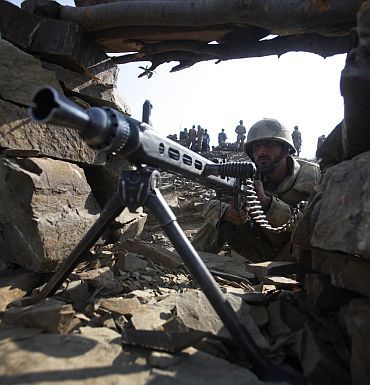This article was first published 14 years ago
Home »
News » 'India has a ticking time bomb next door'
'India has a ticking time bomb next door'
Last updated on: June 23, 2011 10:32 IST
Image: A Pakistani soldier fights insurgents in restive tribal areas
Photographs: Reuters
Bruce Riedel, erstwhile Central Intelligence Agency veteran and senior National Security Council official in the Clinton Administration, who spearheaded President Obama's strategic review on Afghanistan and Pakistan, has said the US-India strategic partnership, "a core relationship for the United States," today faces "its most difficult problem ever that is a ticking bomb next door in Pakistan -- a time bomb which could explode at any moment."
While acknowledging that Pakistan "is usually not on the formal agenda of the US-India strategic dialogue," he said, "There are a number of ways that Pakistan could explode into our consciousness again tomorrow: another Mumbai -- mass-casualty terrorist attack in India; another 9/11 or a Times Square, like last May, postmarked Pakistan; another coup in Pakistan, leading another general back into power; another Abbottabad at any moment based on what the CIA has found in that mountain of information in that (Osama bin Laden's) villa."
Riedel, author of the recently published and much acclaimed, Deadly Embrace: Pakistan, America, and the Future of the Global Jihad, made these observations during the panel discussion on India-US Relations: Six Months after the Obama-Singh Summit organised by the Centre for Strategic and International Studies' Wadhwani Chair on US-India Policy Studies.
Reportage: Aziz Haniffa in Washington, DC
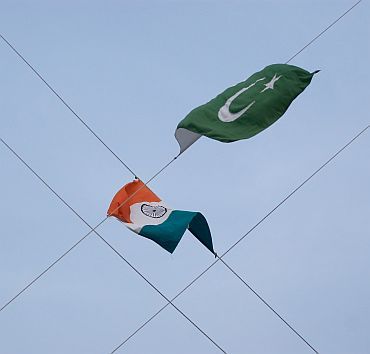
Image: The national flags of India and Pakistan
He said that while all of the progress in India-US relations in the past decade "is real, all of it is important, all of it is transformative, all of it is significant, I would argue the real challenge lies ahead, and that challenge is immediately to the west of India: Pakistan."
Thus, he said, "We need more dialogue, we need more engagement, we need more cooperation working together to think about how we help Pakistan help itself."
Riedel, currently a Senior Fellow at The Brookings Institution -- a leading Washington, DC think tank headed by former Clinton administration Deputy Secretary of State Strobe Talbott, hastened to add, "Don't get me wrong -- I am not suggesting mediation. I'm not suggesting we appoint a special envoy for AfPakI(Afghanistan-Pakistan-India). I opposed the idea of AfPak from the beginning. I am in favor of reintegrating Afghanistan and Pakistan into Mr (Assistant Secretary of State for South Asian Affairs, Robert) Blake's bureau."
"We should create a military command for South Asia," he said, but reiterated, "I don't favour mediation, nor am I proposing a conspiracy that the United States and India somehow plot against Pakistan."

Image: A visitor attends a Pentagon event marking the 9th anniversary of the 9/11 attacks
Photographs: Larry Downing/Reuters
Riedel said, "What I am suggesting is the need to conceptualise urgently where we are going with this most important country. Obviously, we already talk to each other about Pakistan. I've spent hours talking to Indian diplomats in government in four administrations -- under four presidents -- about Pakistan. But we need to take it to a higher level now."
He said this was imperative because otherwise, "The alternative is playing Russian roulette. India has already had three 9/11s, not one 9/11. It had a 9/11 in 2001 in New Delhi; it had a 9/11 in 2006 in Mumbai and it had a repeat performance in 2008."
Riedel predicted that "Another one is coming -- we know that. Yes, Pakistan is the provocateur. Pakistan provides the base for these terrorists to operate from. But that doesn't change the fact that we need to think about how to leverage the US-Indian relationship to assist developing Pakistan in the right place."
He appluaded Prime Minister Manmohan Singh's "very brave decision to move forward with the India-Pakistan engagement," acknowledging that "inviting his counterpart to that cricket match was not only a brilliant political move; it was a brave political move".
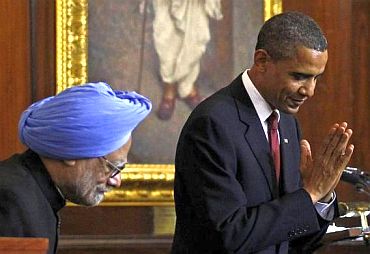
Image: Prime Minister Manmohan Singh with US President Barack Obama
Photographs: Reuters
Riedel asserted, "Sitting at a cricket match is not enough and resuming dialogue is not enough. We need creative problem-solving."
While stating that Washington should not be a mediator but that certainly "it should be a cheerleader," he said, "we can do a little bit more than being a cheerleader -- we can certainly help in creative problem-solving ideas. And this is a role not just for the government, but here is a real role for think tanks like CSIS, like Brookings and others."
Apologising for belabouring the point, Riedel said the bottom line was that Washington and New Delhi "today face a common problem. That problem is a syndicate of terrorist organisations that reside in Pakistan -- Al Qaeda, Lashkar-e-Tayiba, the Afghan Taliban and the Pakistan Taliban. This syndicate of terror has at the top of their target list the United States of America and India."
"Contradictions in the relationship between the Jjihadi Frankenstein and the government of Pakistan are the hardest part to get our heads around," he said. "It's a syndicate of terrorism that is not a monolith, doesn't have a single leader, but operationally works together and works against the United States and India."
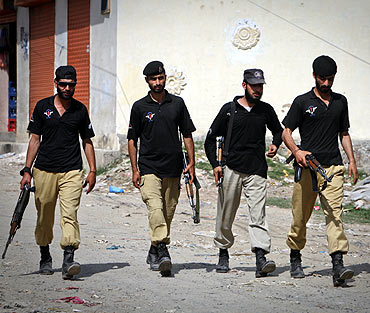
Image: Members of Pakistan's anti-terrorism squad walk past the compound where bin Laden was killed in Abbottabad
Photographs: Reuters
Riedel said, "The government of Pakistan, to be fair, is at war with part of this syndicate," but "at the same time, it's still in bed with other parts of it."
"At this point, we can only conclude that it is incapable of being trusted to deal with this problem," he argued, "Whether it is incompetence or complicity, we cannot rely on the government of Pakistan to deal with it. The United States has now responded with unilateral measures, not just on May 2, but almost every day, from 30,000 feet in the air. India at some point may decide that it has little choice but to do the same."
"We need a coordinated engagement with the government of Pakistan. Both America and India have decided Pakistan is too important not to engage with, even it it's frustrating and even if it's irritating. We need to engage, but we ought to coordinate our engagement," he said.
Riedel also said it's imperative that Washington and New Delhi coordinate their counterterrorism efforts, particularly against the Lashkar-e-Tayiba, which he described as "today probably the most dangerous terrorist group in the world."
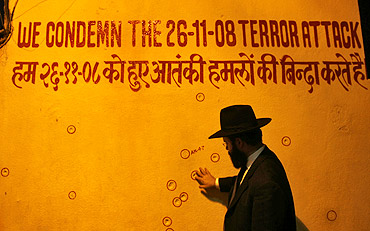
Image: A rabbi touches a wall riddled with bullet holes in front of Nariman House, a target of the 26/11 terror strike
Photographs: Reuters
"We need to share technology and human intelligence," he said, adding, "One practical step that should be done is to share the information from the Abbottabad villa mansion that is relevant to the government of India's interests. And we need to start coordinating contingency planning. The nightmares I described are real. They may not happen in the near-term; they may happen tonight. We need to start thinking our way through them."
During the interactive session that followed, the said the reason he had called for the US and India to start doing contingency planning was because "I cannot see the government of Prime Minister Singh responding to the fourth 9/11 -- a Pakistan-based terrorist attack on an Indian city in the same way it has responded to the last three. That means we're going to go from threats, we're going to go from demarches, we're going to go from breaking communications ties to action."
"When the United States does it," he explained, "we do it as a country which is on the other side of the globe from Pakistan. When India does it, it does it as its next-door neighbour."
Riedel clarified that he was not telling the Indian government "what to do, what not to do. But it's going to be an order of magnitude different. I have good reason to believe that ever since Christmas 2001, and certainly since November 2008, an enormous amount of effort has been spent in the Indian ministry of defence trying to figure out, what are we going to do the next time?
"I'm not asking them to share their contingency planning with us. But the prudent thing for strategic thinkers on both sides, in an outside of government, is to start thinking about that -- the ramifications -- and trying to think through some of that scenario," he added.
